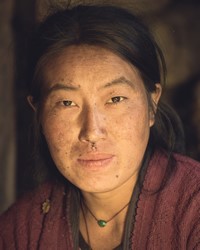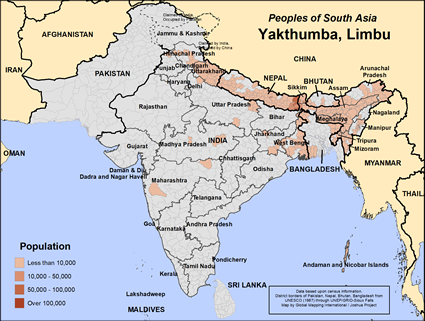Yakthumba, Limbu in Nepal

Photo Source:
manothegreek
|

Map Source:
People Group data: Omid. Map geography: UNESCO / GMI. Map Design: Joshua Project.
|
| People Name: | Yakthumba, Limbu |
| Country: | Nepal |
| 10/40 Window: | Yes |
| Population: | 403,000 |
| World Population: | 548,800 |
| Primary Language: | Limbu |
| Primary Religion: | Other / Small |
| Christian Adherents: | 2.69 % |
| Evangelicals: | 1.34 % |
| Scripture: | Complete Bible |
| Ministry Resources: | Yes |
| Jesus Film: | Yes |
| Audio Recordings: | Yes |
| People Cluster: | South Asia - other |
| Affinity Bloc: | South Asian Peoples |
| Progress Level: |
|
Introduction / History
The origin of the Lumbu is uncertain, but they are clearly of Mongolian descent. In the latter part of the 1700s, Nepal was formed by uniting various ethnic groups and principalities under a high caste Hindu dynasty. This conquest resulted in ethnic and cultural splits with the Lumbu.
The Limbu are one of the largest tribal groups in Nepal. They are a sub-group of the Kirant people. The Lumbu are known as des limbu (ten Lumbu), even though there are actually thirteen Lumbu sub-groups including the Yakthumba. Legend says that five of the groups came from Banaras, India (now called Varanasi) and the other eight from Lhasa, Tibet. There is no social discrimination among the Lumbu sub-groups, although there are a number of different clans and sects.
The Yakthumba Lumbu live mainly in eastern Nepal between the Arun River and the border of the Sikkim district in India. A small number are in Bhutan. They speak a dialect of Kirant, which is a Tibeto- Burman language.
What Are Their Lives Like?
Agriculture is the major source of income for the Yakthumba Lumbu. Rice and maize are their principal crops. There is an abundance of arable land, but they don't have the farming technology to take advantage of it. They often trade their agricultural surplus for food that they cannot grow in their region or for necessary items.
The men generally plow the fields, and the women plant the seeds. However, at harvest time, both men and women work together to bring in the crops. Extended families often unite to help each other during harvest time.
Economic hardship among the Yakthumba Lumbu has made it worthwhile for many of the men to join the army, both in Nepal and in India. This brings them a degree of respect, especially those who have earned a high rank.
The Lumbu peoples marry within their ethnic community, but they do not marry members of their clans or their cousins. Parents arrange for the marriages. The young man's family asks for her to marry him, and they have an elaborate ceremony. She can ask for anything. This is her way of seeing if his family can provide enough to keep her happy.
Women are influential within the Limbu families, especially if the husbands are in the military and stay away for long periods of time. A woman gains recognition after she bears her first child.
Yakthumba Lumbu society is patrilineal, so they trace the line of descent through the males. Related families make up clans. When a clan member dies, the entire group is polluted. They then must all go through a period of re-purification.
Drinking, dancing, and music are very important to the Limbu. Weddings, mourning, gift exchanges, and settlements of conflicts all involve much consumption of liquor. They hold dances if visitors come to the village. These affairs give the young people a chance to meet and enjoy dancing and drinking. They have several kinds of music, one of which is called Domke Akma Palam. People who understand Lumbu musical forms might introduce worship music using this style. Yakthumba Lumbu people enjoy archery. Sometimes these contests have religious meaning, but often they are simply contests where the loser buys drinks for the winner.
What Are Their Beliefs?
The Yakthumba Lumbu are predominantly Buddhists but participate in many popular Hindu festivals. They also have a number of worship practices that involve blood sacrifices. They believe that when a woman marries, she inherits her mother's gods. The woman and her husband then recognize the deities as their household gods.
They also believe in Tagera Ningwaphuma, the creator of life. Yuma is an important goddess to the Limbu people.
What Are Their Needs?
There are very few opportunities for these people to hear that Jesus Christ paid for their sins. Believers with the right skills and resources can help them get a higher yield in their crops.
Prayer Points
Ask the Lord to thrust out Holy Spirit anointed people to share Christ with the Yakthumba Lumbu.
Ask the Holy Spirit to soften the hearts of the Yakthumba Lumbu towards Jesus and his gospel so that they will be receptive.
Ask the Lord to raise up a church planting movement among the Yakthumba Lumbu people.
Pray that the doors of Nepal will open to missionaries.